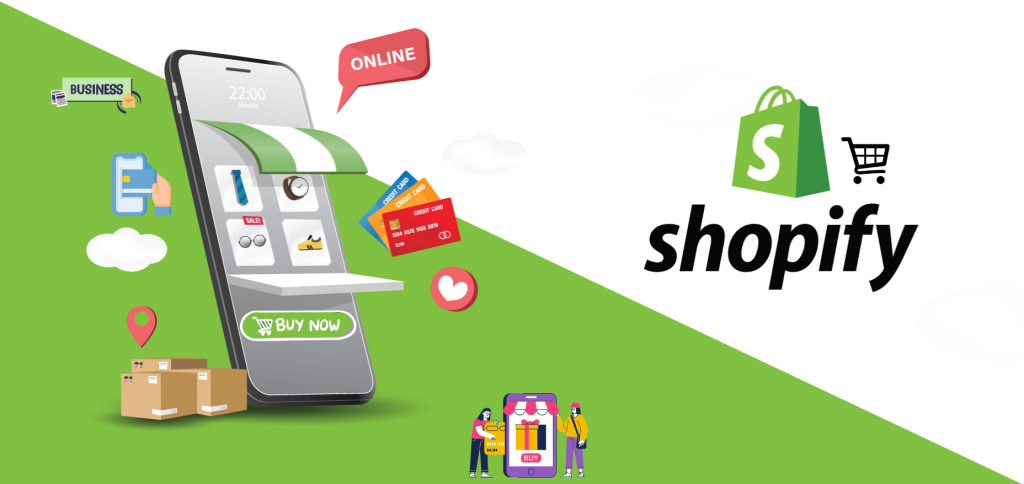Shopify Vs Amazon

Every year, the rising number of online shoppers presents opportunities for those eager to enter the e-commerce industry. Before embarking on your online business journey, selecting an e-commerce platform where you’ll establish your presence is imperative. While numerous feature-packed platforms are available, this guide will concentrate on two widely favored choices—Shopify and Amazon.
Shopify, which is renowned for its user-friendliness, distinguishes itself by actively empowering users to easily sell goods and services online. Meanwhile, Amazon is an online marketplace that attracts millions of consumers. The user-friendly Shopify actively empowers e-commerce business owners by requiring website development for the creation of their brands. However, individuals who want to benefit from the thriving Amazon marketplace should use Amazon.
Although both alternatives are reliable and can be used concurrently, they each come with their own set of pros and cons. Let’s compare Shopify and Amazon, assessing key features, pricing, and pros and cons, to help you make the best choice.
A Comparison between Shopify and Amazon
| Shopify | Amazon | |
| Platform-type | Website builder and host | Third-party marketplace |
| Pricing | $25 to $399 per month | 99 cents per item sold on the Individual plan; $39.99 per month for the Professional plan. |
| Templates and Design | Equipped with an online website builder and a wide range of paid and unpaid templates for different industry types. | No power over how Amazon’s store is designed. |
| Marketing Options | Integration of social media, gift cards, promo codes, and credits for Google Ads. | Amazon paid advertisements and competitive costs. |
| Transaction Fee | Zero percent only when using Shopify Payments on all plans. When utilizing an external payment gateway, transaction fees for Shopify Lite and Basic Shopify are 2%, for Shopify it’s 1%, and for Advanced Shopify, it’s 0.5%. | Based on the product type, all sellers are required to pay a referral fee. |
| Mobile-Responsive | Yes | Yes |
| Customer Support | Shopify Lite provides email and live chat assistance 24/7, while all other plans provide live chat, email, and phone help 24/7. | Get in touch with the Amazon Seller Support team via a Seller Central account. |
For both platforms, there are many pricing alternatives. You can create and establish your online store, add products, and effectively manage inventory with Basic Shopify for just $25 per month. Access to their comprehensive reporting capabilities, calculated carrier delivery, and foreign pricing adjustments are available with more expensive solutions.
An Individual plan and a Professional plan are Amazon’s two pricing tiers. For each item sold under the Individual plan, retailers are required to pay $0.99. The Professional plan, meanwhile, costs $39.99 per month. For consumers who don’t use Shopify Payments, Shopify levies a transaction cost of up to 2%. In contrast, Amazon imposes a referral fee based on the product category for each item sold.
Additionally, Amazon merchants have little control over the appearance of their storefronts. They rely on Amazon paid advertisements to draw customers, but the platform is quite competitive. Users of Shopify can design and tailor their online store, but they must create their brand from scratch.
Creating a Storefront
Shopify provides over 100 meticulously designed themes that offer extensive customization options. These themes cater to a wide range of businesses, spanning from apparel and accessories to sports and recreation. Because the web builder is simple to use and browse, beginners can immediately open their store.
Under the Individual plan, obtaining a personal Amazon Seller account is free. However, unlike Shopify, you cannot create a storefront. Nevertheless, you do have full control over the product images and descriptions. It’s harder to draw customers in because Amazon displays your products next to those of your rivals.
Marketing Options
Shopify empowers users to build their online stores, offering a contrast to Amazon’s single-platform approach. However, on Shopify, you’re responsible for independently marketing your business and attracting visitors to your website. Fortunately, Shopify provides strong SEO and marketing capabilities that integrate easily with social media and enable sales on sites like Facebook. You can also boost sales through discounts and gift cards. While marketing can be challenging, Shopify doesn’t display your products alongside those of your competitors, reducing competition.
Order Fulfillment
Amazon FBA is available to business owners who don’t want to bother with handling inventory and product fulfillment. Individual selling accounts, on the other hand, have a storage limit of 10 cubic feet, while professional selling accounts do not. Additionally, there are charges determined by the product’s weight, size, kind, and distribution routes.
Bottom Line
Both platforms make it possible for e-commerce business owners to launch their websites, but they differ greatly from one another. Shopify excels because businesses selling niche products or building their brand can benefit from its customizable online stores and active support. Amazon, on the other hand, has a lower entry hurdle. You can start selling anything, including brand-new and used goods, after creating an account. In the end, the ideal decision will depend on your long-term goal of starting an online business.
Why Choose Shopify To Build Your E-Commerce Store?
Learn why Shopify is the platform of choice for millions of business owners, from start-ups to public offerings. Anyone can create an online store and sell things using the Shopify E-commerce platform. Additionally, it permits business owners to use Shopify POS to sell their goods directly.
Tobi, Shopify’s founder, initially created the platform over a decade ago with the goal of selling snowboards for his business, Snowdevils. He established Shopify to aid him in his business attempt after seeing how challenging it was to sell snowboards online without a suitable E-Commerce platform. Shopify development is one of the top E-commerce development methodologies in the present day and is intended for companies of all sizes.
Strategic Benefits of Shopify for Your Business
For more than 15 years, Shopify has been changing the game of e-commerce, and its benefits and ease of integration make it an easy, common-sense choice for many businesses.
Shopify has become a global phenomenon, with nearly two million websites using it in nearly 200 countries. Why does your company require Shopify? Shopify may be a simple answer to complicated logistical difficulties in this era of global commerce driven by the internet, and there are numerous practical benefits to go along with its seamless integration.
Shopify not only allows businesses to ease merchandising and the online checkout process, but it can also help with marketing and consumer engagement.
What are the most significant features of Shopify?
Shopify is one of the simplest methods to start an internet business while yet leaving room (and functionality) for expansion. Why begin with a commerce platform that will be unable to meet a company’s needs if it reaches significant success? Many of Shopify’s top accounts began with a smaller commerce host and were forced to migrate to Shopify after outgrowing their old platform.
Shopify enables you to build a professional-looking e-commerce solution with every feature and capability a business owner could desire. Creating an e-commerce website from scratch may be extremely expensive and time-consuming, but Shopify is the logical solution.
Users can bring their website design and store to life by selecting from a collection of free, customizable templates. The platform handles marketing, payments, and security, allowing the user to focus on what they do best: bring ideas to life and develop their business.
Profiting from Shopify
Many organizations spend months, even years, developing a viable online merchandising solution. Creating an internet business is a full-time job in and of itself; Shopify provides a solution to alleviate this load and begin making money more quickly. Shopify also offers a network of specialists available to their users who can assist you in getting started and identifying potential consumers.
According to data in Entrepreneur’s latest book on Shopify, internet shoppers now account for 18% of global retail sales. By the end of 2023, that figure is predicted to climb to 22% of global sales. If you aren’t currently selling on the internet, now is the time to start, and Shopify is the platform that will help you succeed.
What is the price of Shopify?
Shopify has three pricing options for business owners. There are three tiers available:
- Basic ($25/month)
- Shopify ($65/month)
- Advanced ($399/month)
Furthermore, Shopify allows consumers to pay for a full year of service in advance, saving them up to 50% off these three levels. Benefits will increase with each subsequent tier (such as more customizable and complex reporting data, more staff accounts, more inventory locations, and greater shipping discounts), and a user’s credit card price-per-transaction fee will also decrease as business owners move up the subscription tiers.
It’s also worth noting that none of Shopify’s options include a startup fee.
Shopify provides entrepreneurs with a more scalable option
There are countless tales of business owners who began on smaller-scale business solution sites like Etsy and then realized they wanted more and switched to Shopify for a more personalized and scalable solution. One of the most common reasons that entrepreneurs switch to the Shopify platform is that the competition does not provide the same capabilities.
Shopify is a comprehensive toolkit for crafting your unique online presence, and it’s presently employed by some of the world’s largest corporations, making it exceptionally scalable.
How Shopify Works?
Regardless of the type of business you own, if you are looking for clients and want to build a sustainable business, Shopify development is the way to go. Shopify is home to thousands of businesses from more than 175 countries who wish to sell their products online.
Here is a list of Shopify items and services that you can sell. Although you may be certain of what you want to sell, Shopify can provide advice to help you expand your business into unfamiliar territory.
Physical Products: Anything that you build by hand or manufacture is a physical product. Electronics, Water Bottles, T-shirts, LED Lights, Jewelry, and Fashion accessories are the best physical products that can be sold on Shopify.
Digital Products: A digital product, an intangible asset or media, can be sold and distributed online without the need for frequent inventory replenishment. These products are typically downloadable or streamable digital files like MP3s, PDFs, videos, plug-ins, and templates. Membership sites, Educational Products, Digital Templates and Tools, Music or Art, and Licenses to use your digital assets are the best digital products to sell on Shopify.
Services and Consultations: Whether you’re an interior designer, a dentist, or a life coach, your consumers may book your services on Shopify for an in-person consultation or work.
Memberships: Shopify lets you sell memberships or subscription packages to various industries, such as yoga studios, for member-only access to your business area and website content.
Ticketed Experience: Ticketed experiences include everything from travel and adventure to wine sampling and courses. Shopify enables you to create a platform for interested parties to book tickets to your event and assists you in conducting proper networking for your event.
Classes and Lessons: Customers can buy, rent, and book lessons from you through your Shopify store.
Rentals: Rental-based service enterprises are offered on Shopify. Renting clothes or props is simple on Shopify platforms.
You can barely sell anything on Shopify, so we encourage you to check through the official terms of service to be confident about the laws related to the services you are selling.
To create an eCommerce store, you must first grasp the in-depth functionality of many Shopify procedures, such as:
- Recognizing Development Stores.
- Making development Stored.
- Improving Development Stores.
- Transferring ownership of a store.
- Access to existing stores is being requested.
- Development stores are archived.
Shopify’s Key Benefits
- Simple Setup and User-Friendly: By utilizing self-hosted systems such as Magento, Shopify development provides a straightforward procedure for swiftly launching an online store without the hassle of servers and development costs.
- Zero Technical Concerns: Because Shopify provides the technical skills required to establish a basic Shopify store, you won’t have to worry about software or hosting platform technologies.
- User-Friendly Backend System: Because Shopify provides the technical skills required to establish a basic Shopify store, you won’t have to worry about software or hosting platform technologies.
- Security and Dependability: By utilizing self-hosted systems such as Magento, Shopify development provides a straightforward procedure for swiftly launching an online store without the hassle of servers and development costs.
- Round-the-Clock Customer Support: Shopify development offers extensive customer support and is available 24/7 with quick reaction times, ensuring that your business runs well on its own. The 24/7 customer care also saves any company time and money on problem-solving, eCommerce store optimization, and management.
- Affordable Pricing: Shopify offers business owners a reliable and versatile store-building option that can enhance sales while reducing administrative and important management work at the most affordable prices.
- Mobile-Responsive Website: We feel that it is critical to design a website mobile mobile-friendly because more than half of consumers view a website using a mobile device. All of our Shopify themes are mobile-friendly and contain mobile commerce shopping carts built in.
- SEO-Friendly and Robust Marketing Tools: Shopify enables you to optimize your eCommerce store using the greatest SEO methods to ensure your company’s ongoing growth and development. Shopify offers a variety of data analytics to assist you in improving your tactics and store management for a more seamless user experience. Furthermore, Shopify may be combined with sophisticated marketing solutions that suit all of your digital marketing demands to help you grow your business on the Internet.
- Integrated Apps and App Integration: Shopify enables you to optimize your eCommerce store using the greatest SEO methods to ensure your company’s ongoing growth and development. Shopify offers a variety of data analytics to assist you in improving your tactics and store management for a more seamless user experience. Furthermore, Shopify may be combined with sophisticated marketing solutions that suit all of your digital marketing demands to help you grow your business on the internet.
- Seamless Payment Integration: Shopify enables the straightforward integration of payment gateways, allowing you to provide your customers with smooth and hassle-free shopping and checkout.
Guide to Shopify Pricing Plans in 2023
Shopify is a popular e-commerce website builder that provides all of the tools required to start and manage an online store. It began as a standalone platform, allowing businesses to incorporate Shopify directly into their website or redirect buyers to a secure Shopify page to complete transactions. But it didn’t remain that way for long, and it now offers website hosting as well as help for selling on other online marketplaces such as Amazon and eBay.
It is an easy-to-use interface that allows businesses to communicate with customers, increase sales, and manage operations. This is accomplished by providing four distinct designs ranging from basic to advanced. Here’s a breakdown of each offering, along with pricing information.
Whether your company is small and new or large and established, there is almost certainly a Shopify plan that will meet your goals and budget. It’s also a very scalable platform, so if you start small, you can easily scale up as your business expands.
Standard Shopify platform features include 24/7 support and a multitude of tools for entrepreneurs, as well as automatic changes to orders, products, and inventory. The higher the tier plan you select, the more options are available, ranging from shipping discounts and labels to fraud analysis and language translation.
Comparing Shopify’s Tiered Pricing and all Plan Features
| Basic | Shopify | Advanced | |
| Pricing | |||
| Pay Monthly Pay Yearly | $25 USD/monthly $19 USD/monthly | $65 USD/monthly $49 USD/monthly | $399 USD/monthly $299 USD/monthly |
| Features | |||
| Create an Online Store | Yes | Yes | Yes |
| Storage and Data Transfer | Unlimited | Unlimited | Unlimited |
| Logins for Employees | 2 | 5 | 15 |
| Inventory Location Limits | up to 1,000 | up to 1,000 | up to 1,000 |
| Unlimited Product Listings | Yes | Yes | Yes |
| 24/7 support | Yes | Yes | Yes |
| Sales channels | Yes | Yes | Yes |
| Hydrogen Storefronts | 1 public storefront | 1 public storefront | 1 public storefront |
| Manual Order Creation | Yes | Yes | Yes |
| Discount Codes | Yes | Yes | Yes |
| Gift Cards | Yes | Yes | Yes |
| Complimentary SSL Certificates | Yes | Yes | Yes |
| Recovering Abandoned Carts | Yes | Yes | Yes |
| E-commerce Automated Processes | Yes | Yes | Yes |
| Analytical Reports | Basic | Standard | Advanced |
| Third-party calculated shipping rates | No | No | Yes |
| Customer Segmentation | Yes | Yes | Yes |
| Marketing Automation | Yes | Yes | Yes |
| Unlimited Contacts | Yes | Yes | Yes |
| Shopify Marketplace Connect | |||
| Import Marketplace Orders | Yes | Yes | Yes |
| Connect and List Products | Yes | Yes | Yes |
| First 50 Shopify-Synced Orders | Yes | Yes | Yes |
| More than 50 Shopify-Synced Orders | 1% up to $99/month USD | 1% up to $99/month USD | 1% up to $99/month USD |
| International Commerce | |||
| International Market Management | Yes | Yes | Yes |
| Market domains and Subfolders | Yes | Yes | Yes |
| Language Translation | Yes | Yes | Yes |
| Currency Conversion | Yes | Yes | Yes |
| Local payment Methods | Yes | Yes | Yes |
| Duties and Import Taxation | No | No | Yes |
| Product Pricing by Market | Yes | Yes | Yes |
Added Expenses with Shopify
Users frequently pay for premium themes and add-ons in addition to the cost of Shopify subscriptions. While some opt for free Shopify themes, businesses often invest in premium ones for immediate access to desired features and styles. Premium themes range in price from $75 to $300, yet they can be cost-effective because they save you time by making site construction quicker and faster.
Here are some of the most frequent charges connected with using Shopify:
Selecting a Domain Name:
A domain name registrar, such as Google Domains or DreamHost, must be acquired separately for roughly $15 per year.
Exploring Premium Themes:
While some use free Shopify themes, businesses often buy premium ones for immediate customization to achieve their desired website appearance. Premium themes range in price from $75 to over $300.
Premium Apps and Plugins:
Businesses frequently pay to employ premium plugins to increase the functionality of their Shopify store. Pricing varies depending on the plugin but can range from $5 per month to hundreds of dollars.
Time:
Building your own internet store will, of course, take time.
Development and Customization:
Many businesses may hire a web developer or designer to aid in Shopify site development or troubleshoot any arising issues.



